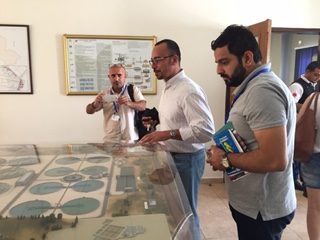Jordan: Covering Water Issues for Middle Eastern Journalists

Twenty-five journalists from nine Middle Eastern and North African countries attended the five-day covering water issues workshop in May 2016 in Amman, Jordan. Journalists from Bahrain, Egypt, Iraq, Jordan, Lebanon, Morocco, Tunisia, Saudi Arabia and United Arab Emirates attended the training.
Course Objectives
- Build capacity for media professionals affiliated with radio, TV, print, internet, or mobile, who report in Arabic on environmental and water issues
- Create a core group of professional journalists who can inform readers and viewers about water shortage in the region, and how to deal wisely with the problem
The training program included the following sessions:
- Water Scarcity & Economic Impact in the Middle East: An Overview
- An In-Depth Look at the Water Situation in the Middle East:Groundwater/Acquifers, Surface Water and Depletion
- Impact of Climate Change on Water in the Middle East and North Africa
- Water and Dams Industry, Energy and the Environment
- Agriculture, Irrigation and the Future of Food in the Middle East and North Africa
- Thinking about Water: The Islamic Perspective
- Ethics in Journalism
- The Basics of Good Reporting on Water in Different Formats
- New Tools for Journalists Covering Water: Satellites, Mapping, Crowd-Sourcing
- The Way Forward on Water: The Role of Journalists in Natural Resource and Ecosystem Management
- Data-Driven Journalism: Using Data and Social Media to Connect with Audiences on Water Issues, and Hands-on Practice Using Data Tools
- New Ways of Engaging Communities about Water Conservation.
Journalists went to the Dead Sea and to the As-Samra Wastewater Treatment Plant.
The project provided on-going grants to journalists to continue covering water issues.


